JEFF STANTON INTERVIEW: THE FLAME THAT BURNS TWICE AS BRIGHT BURNS HALF AS LONG
JEFF, DID YOU BEGIN RIDING DIRT BIKES ON YOUR FAMILY’S MICHIGAN FARM? Yes, my brother John and I had some minibikes and rode around the farm. It just started as family fun. My mom had bikes, my dad had bikes, and we always rode around the farm. That later led to buying property in Northern Michigan where there were tons of trails. I remember the many trips up there on minibikes, falling over in the sand an endless number of times and mom and dad picking us up. There were multiple families going riding up north, and then later snowmobiling. It was a huge family/friend get together. Up north has always been a big thing to us. Now many years later, my son and I enjoy going up there and riding in the woods.
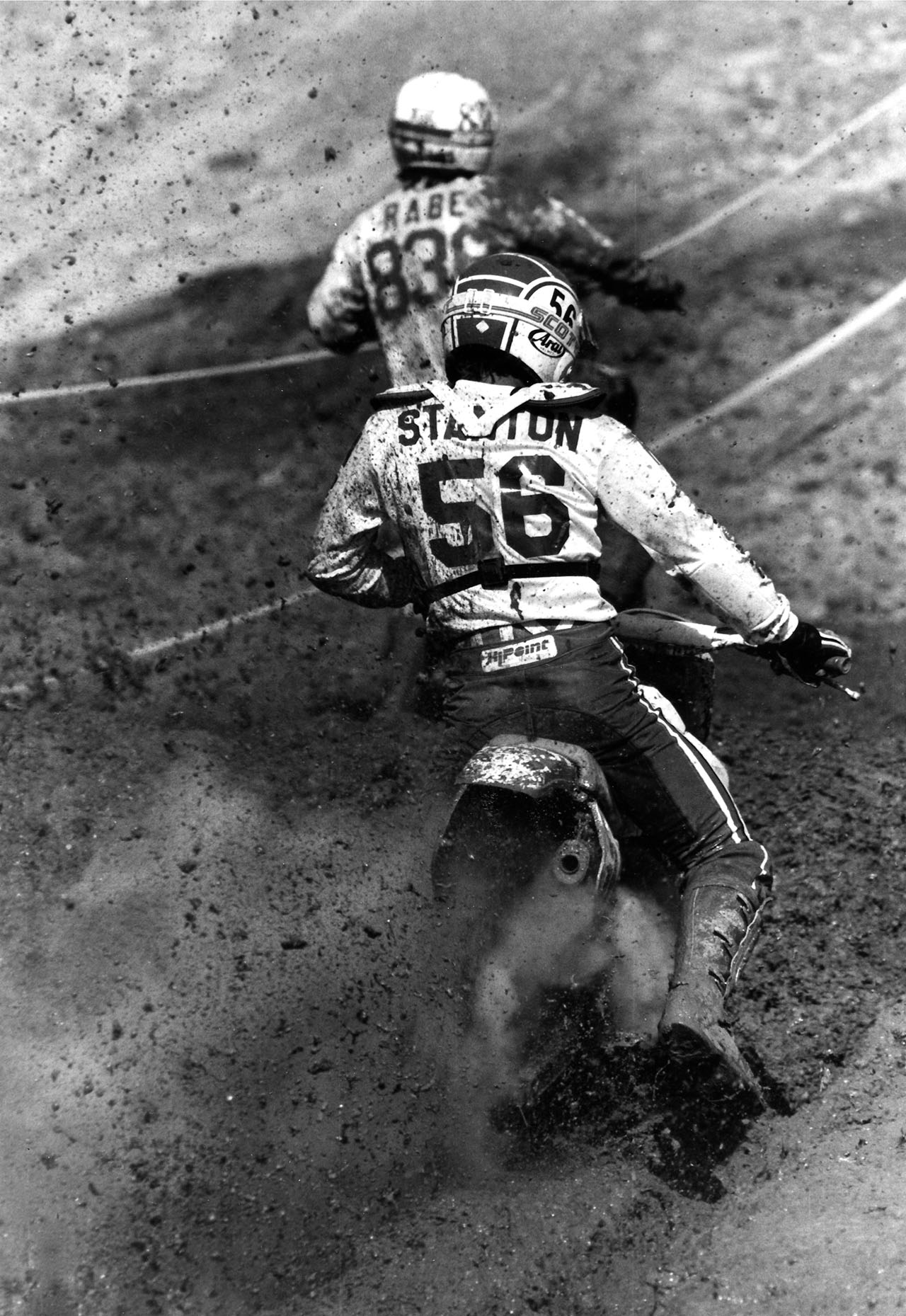
WHAT INSPIRED YOU TO ENTER YOUR FIRST MOTOCROSS RACE? There is a local track just 10 miles from my home in Bronson, Michigan, called Log Road, and that is where we first went when we were little kids. What brought that on, I am not sure. I think my parents said, “Hey, let’s go racing,” so we went. My mom raced, my brother and I raced, and my dad worked on the bikes. It was like starting off in T-ball. It is the same kind of stepping system in motocross as any professional sport. We started off racing local races in the late 1970s in Michigan, back when there were 800,000 motorcycles. It was not uncommon to go to a local race and have 800 to 1000 riders for a Saturday/Sunday event. I can remember traveling with so many families in the Michigan area. That was what you looked forward to every weekend; going to the races, sitting by the campfire on Saturday night, and spending the next day racing. We raced all over the state, and it was an awesome time. Fortunately for me, things progressed. The amateur nationals were good for me in the mid- through later 1980s.
WHEN DID YOU REALIZE THAT YOU COULD MAKE IT AS A PRO? That was probably around 1984. The support back then from the manufacturers was absolutely insane. You can look back to the Team Green and Yamaha era and see what they did to support the Amateur racing back then. I was making the transition onto a big bike, and Yamaha was behind us. Back then, they would give you six or seven bikes a year, a $20,000 parts allowance and travel expenses. Without the manufacture’s support back then, as farmers we would not have ever been able to do it. Fortunately, with the great support and great people behind us, I produced results. It was in 1985 that I was on a big bike and won a couple of Loretta Lynn’s titles. I started following professional racing and got obviously more serious about it. My dad and I traveled around and hit most of the amateur races at all the outdoor professional races. My parents always stuck to their guns saying, “You are not going to turn professional until you graduate high school,” which is unheard of in today’s world. When I graduated from high school, we went out to Washougal, Washington, and raced my first pro race with Yamaha and it all started.
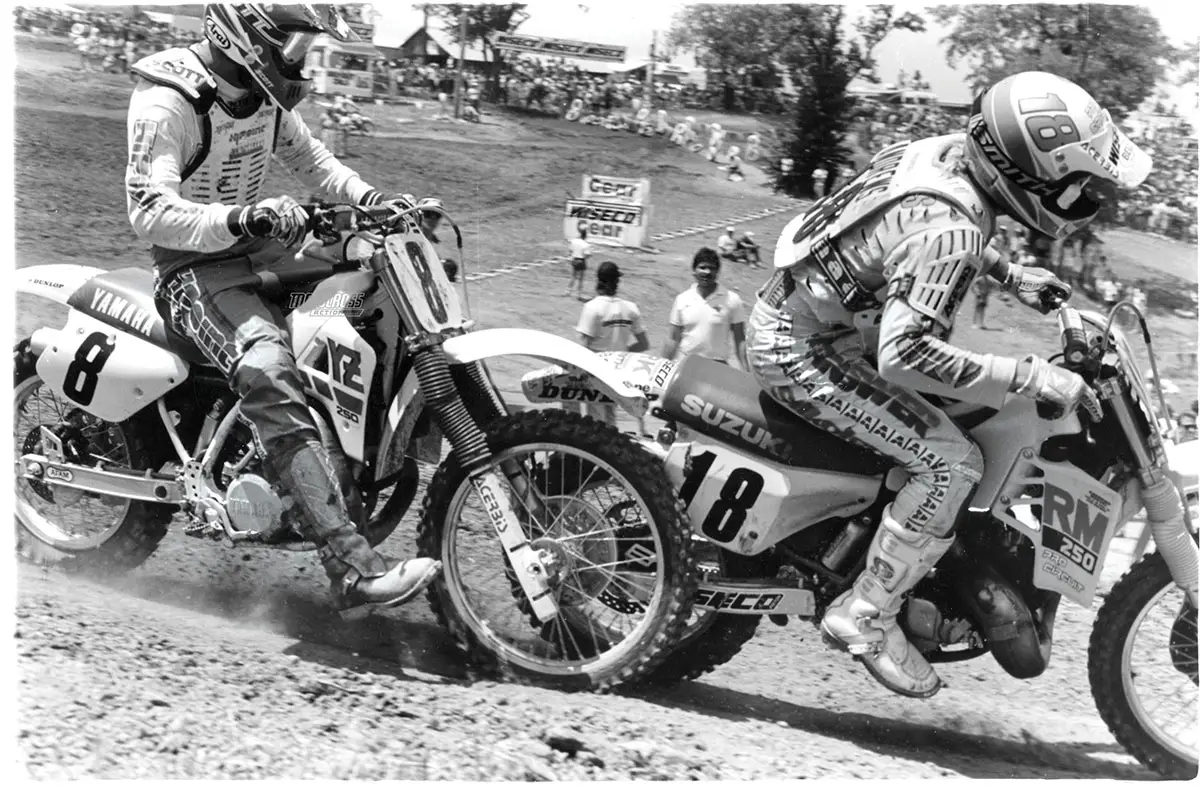
YOU FINISHED 7TH OVERALL IN YOUR FIRST AMA NATIONAL. YOU MUST HAVE BEEN ECSTATIC? Oh, for sure. I will never forget that race. Broc Glover was hurt, so Keith McCarty (Yamaha Team Manager) called and said, “Hey, do you want to come out and race Washougal? You and your dad can fly out early. We will test, and you will have the full setup. We will back your ride.” It worked out well. I got great starts, rode solid and ended up 7th overall at my first AMA 500 National. My National number went from 971 to 56 for the 1987 season.
IS IT TRUE THAT YOU NEVER RACED THE 125 NATIONALS? Back in the day, the 100cc class was popular, and I had just won the National Amateur Championship in a 100 class, but Yamaha had given out all of its 125 support programs. They still had lots of big bike support programs, though, so I said, “Okay, I’ll will take it!” I was a big kid, so it wasn’t too bad. I took what was available. Yamaha gave me six YZ250s and a couple of YZ490s. That was how it worked out. I won Loretta Lynn titles in the 250 and 500 classes for a couple of years after that.
AFTER YOUR FIRST WASHOUGAL NATIONAL, DID YOU TURN PRO FULL-TIME? Yes, 1987 was my full-time debut with Yamaha doing Supercross and outdoor Nationals in both the 250 and 500 classes. I did all the Supercross rounds in 1987. I took second at the Daytona Supercross (the year that Ricky Ryan won in the huge mud race). Then I did great in the 1987 500 Nationals. I battled a lot with Ricky Johnson and Jeff Ward. I surprised a lot of people. I went from national number 56 to number 8. In 1988, I did all the Nationals and the Supercross series.
“I WAS SUPER DISAPPOINTED WITH YAMAHA. I HOPE THERE HAVE BEEN TIMES WHEN YAMAHA’S KEITH MCCARTY LOOKED BACK AND
SAID, ‘WOW, I MADE A BIG MISTAKE.’”
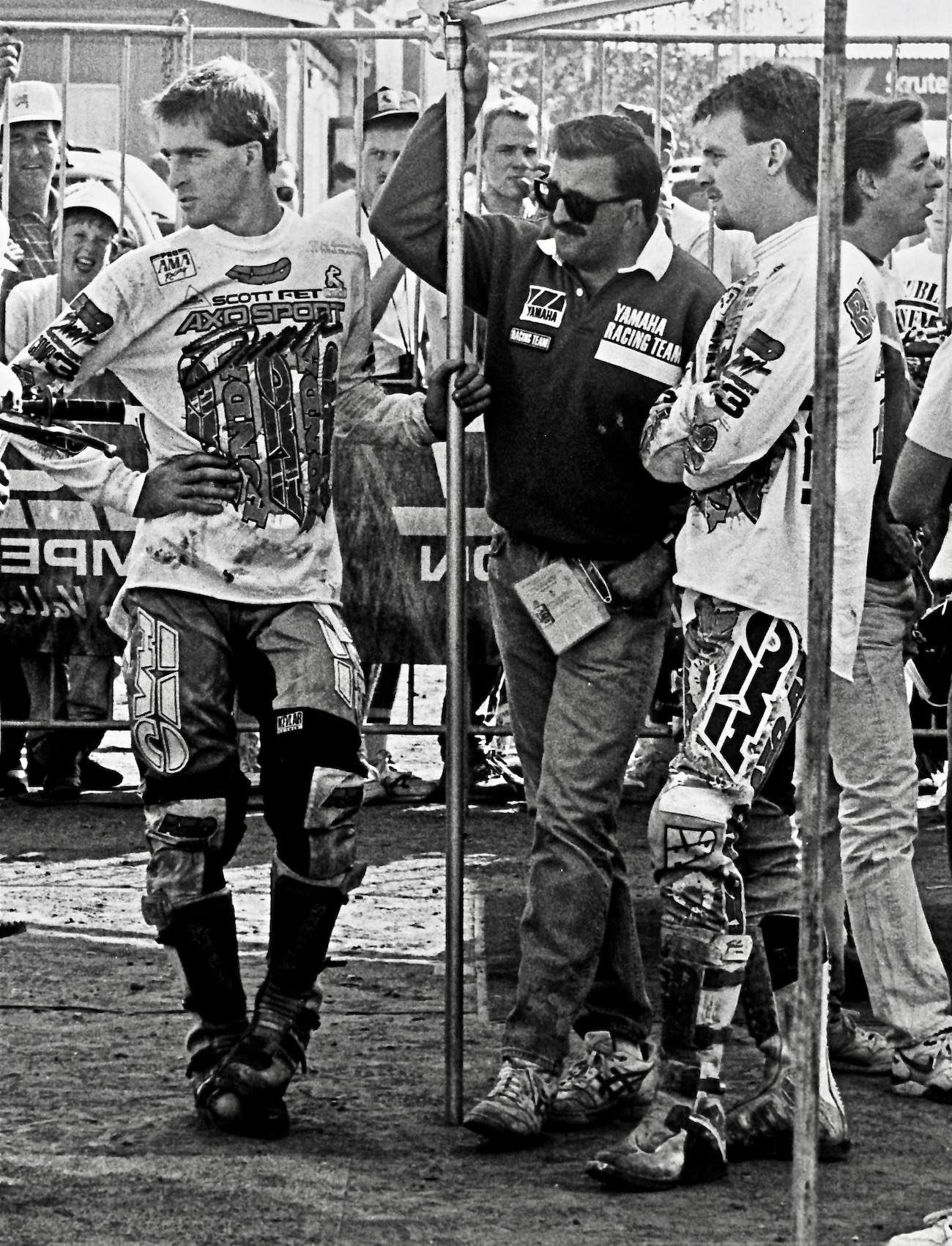
WHAT MADE YOU LEAVE YAMAHA FOR HONDA IN 1989? I was super disappointed with Yamaha. I didn’t think that Yamaha really thought that I was going to make it to the next level in 1988. I was not great at Supercross, but I did well in the 250 Nationals. I was within the top five consistently, but I really shined on the 500. I would battle with R.J. and Wardy weekend after weekend on the 500. I kept talking to Yamaha, but they did not want to step up. Ricky Johnson and I were friends, so on the 4th of July in 1988, he came back to Michigan and stayed with me for a week. Of course, he was on a Honda and I was on a Yamaha, and that is where the whole talk about racing for Honda started. Ricky and Honda team manager Dave Arnold saw my ability, and I signed a deal before the end of 1988 with Honda. I never looked back. I hope there have been times when Yamaha’s Keith McCarty looked back and said, “Wow, I made a big mistake.” Johnny O’Mara, David Bailey, Ricky Johnson and Bob Hannah were all on factory Hondas, and that was where I wanted to be. The red color, the look, and the JT gear; that is what everybody wanted. That was the elite back then.
IS THAT WHEN YOU MOVED IN WITH RICKY JOHNSON IN CALIFORNIA? I lived with R.J. for the entire winter, and I learned a ton from him training wise and riding wise. At the start of the 1989 Supercross season, he won like seven or eight races in a row, and I was either second or third behind him. We trained together every day. We ran together and rode together. He was on a roll. Then everybody knows what happened to him at Gainesville, Florida, when he got landed on by privateer Danny Storbeck. That injury spiraled his career downward. I was fortunate to be next in line at Honda, position wise, and took over from there.
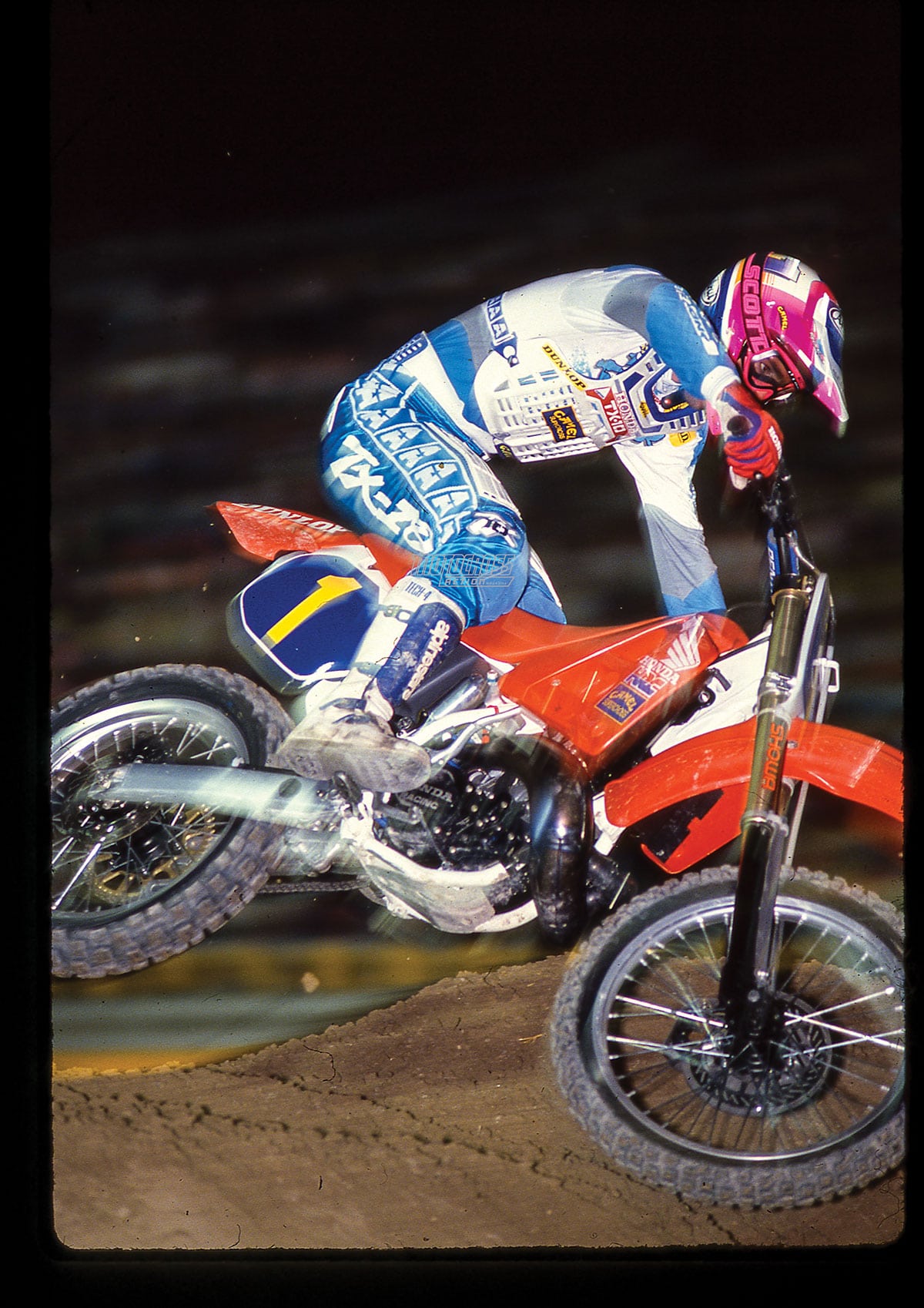
DID THAT DAMAGE YOUR RELATIONSHIP WITH RICKY? Yes, it was a severe strain. I tell people this all the time, “If you want to be successful, surround yourself with successful people. If you want to be bad, surround yourself with bad people.” Bottom line, I surrounded myself with good people. Ricky was gracious enough to open up his door. I lived with him, and I took it all in. It was awesome, but it was also stressful. He got hurt, and I took over. I would call him often and ask how his hand was, how his wife was, and how he was doing. But it would always come back to what he did while racing. It always centered on the racing, and I would just get tired of that after a while. I wanted to really talk to him, but he just wanted to talk about what he did on a bike. I was super grateful and appreciated everything that he did for me, and still feel that way, but I am sure it was tough for him mentally. Ricky and I get along great now. Everybody is older and more mature, but our relationship was strained for quite a few years.
WHAT WAS IT LIKE TO BE THRUST INTO THE SPOTLIGHT? Fortunately, I was raised well. I knew where I wanted to go. Today, I coach 8th-grade boy’s basketball and I just explained this to my players last night. “Boys, there are two paths. There is a path that you can take that is made up of sex, drugs, rock-n-roll and cool-guy status. Is that going to get you what you want? Or, there is the path where you work hard, put your head down, and surround yourself with good people. You can still have fun, but you will get a lot further in life.” I had great parents, and they taught me good values. I surrounded myself with good people. My mentor and best friend was Bevo Forte. I don’t care if I was in the States or in Europe; he was there prepping my goggles. We would always stay together. He was my father figure on the road. After all, how much trouble could I get into with Bevo; other than eating too much Italian food. When I look back and I see my success in racing, it was because of who I surrounded myself with.
ONE OF YOUR BIGGEST COMPETITORS WAS DAMON BRADSHAW. YOU TWO WERE GOOD FRIENDS RIGHT? It went way back to the Amateur days with Damon. He had unlimited Yamaha support with the smaller bikes while I had it on the big bikes. We traveled together and we were family friends with the Bradshaws way back in the mid 1980s when we were really teammates. The best way that I can explain Damon is that he was a fierce competitor. He was super talented. If you go back and watch races where he and I battled, we would pass each other 15 times in each moto. We could battle so close because we trusted each other. He knew that I was going to race him hard but that I was not going to take him out. Sadly, that style of racing disappeared in the mid 1990s. Now all you see are riders resorting to takeout moves.
“IF KEN ROCZEN DOESN’T WANT SOMEBODY ON THE TEAM WHO IS GOING TO
BUTT HEADS WITH HIM, HE WILL MAKE SURE THAT HONDA DOESN’T HIRE THAT GUY. HE WANTS SOMEBODY HE CAN CONTROL.”
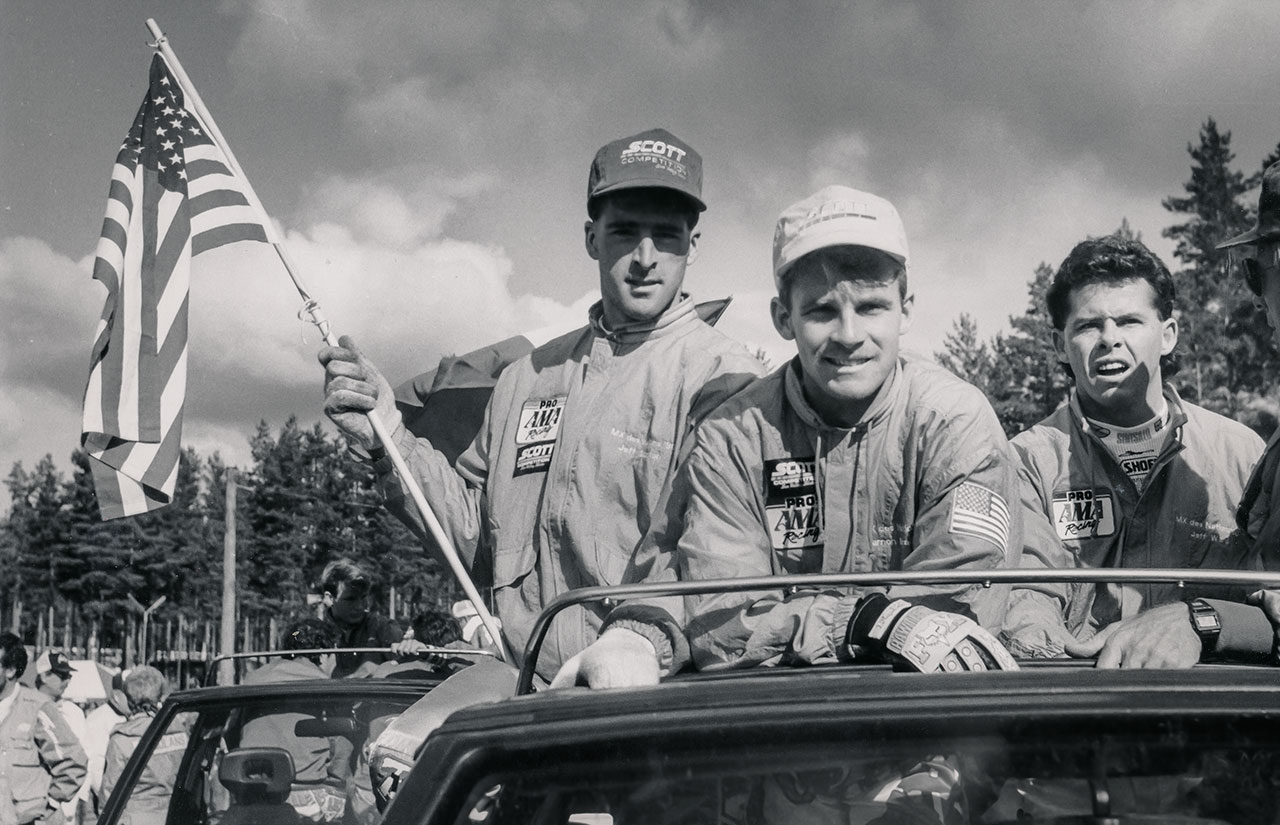
HOW ABOUT YOUR RIVALRY WITH JEAN-MICHEL BAYLE? He was super talented, but I knew if it was hot, rough and gnarly that I would end up on the good side of things because of my fitness. I never wanted him to beat me. People often say we hated each other, but it was not that we hated each other so much; it was just that we never communicated. We probably talk more these days than we did as Honda teammates. I think that competition between teammates is a good thing. That is also lost now. If Ken Roczen doesn’t want somebody on the team who is going to butt heads with him, he will make sure that Honda doesn’t hire that guy. He wants somebody he can control. Instead, team managers should put two pit bulls on the same team and see what happens. I think both riders would benefit, and that makes the team more dynamic. Instead of having a top dog and someone two steps underneath, you should have two ferocious competitors who elevate each other. Dave Arnold was a genius when it came to that kind of stuff. He knew what he was doing; he was invincible as team manager. Dave knew how to make it happen.
THE 1992 LOS ANGELES COLISEUM SUPERCROSS WAS ONE OF THE WILDEST FINISHES IN SUPERCROSS CHAMPIONSHIP HISTORY. I went into that race hoping to win. That was the only thing I could control. If I won, I still wasn’t guaranteed to win the title, because if Damon Bradshaw made the top three, even if I won, he would win the title. The real race was what happened behind me. During daytime practice, I sucked. In the first heat race, I did not make it into the main and had to go to the semi. Before the semi, I told myself, “Jeff, this is stupid,” so I put my running shoes and shorts on and went for a run. The Coliseum was in downtown L.A., and I remember going for a three-mile run before the semi just to get warmed up. People thought I was crazy to go running in what was a very bad neighborhood.
BREAK DOWN WHAT HAPPENED IN THE MAIN EVENT? I can still remember Guy Cooper coming up, giving me a big hug and saying “Dude, whatever it takes, I am going to help you.” Then, Guy pulled the holeshot with me in second place. I got by him right away, but he rode the ride of his life to finish on the podium. My Honda teammate Jean-Michel Bayle and Damon Bradshaw, who was my rival for the 1992 Supercross Championship, started in the back of the pack. Bayle was just staying in front of Bradshaw. If you go back and look at the video, Bayle is definitely not trying to help me out. He was riding just fast enough to stay in front of Bradshaw (and Bradshaw is riding so bad that they looked like two beginners). I just did what I had to do, won the race, and Damon finished fifth. It all played out the way it was supposed to.
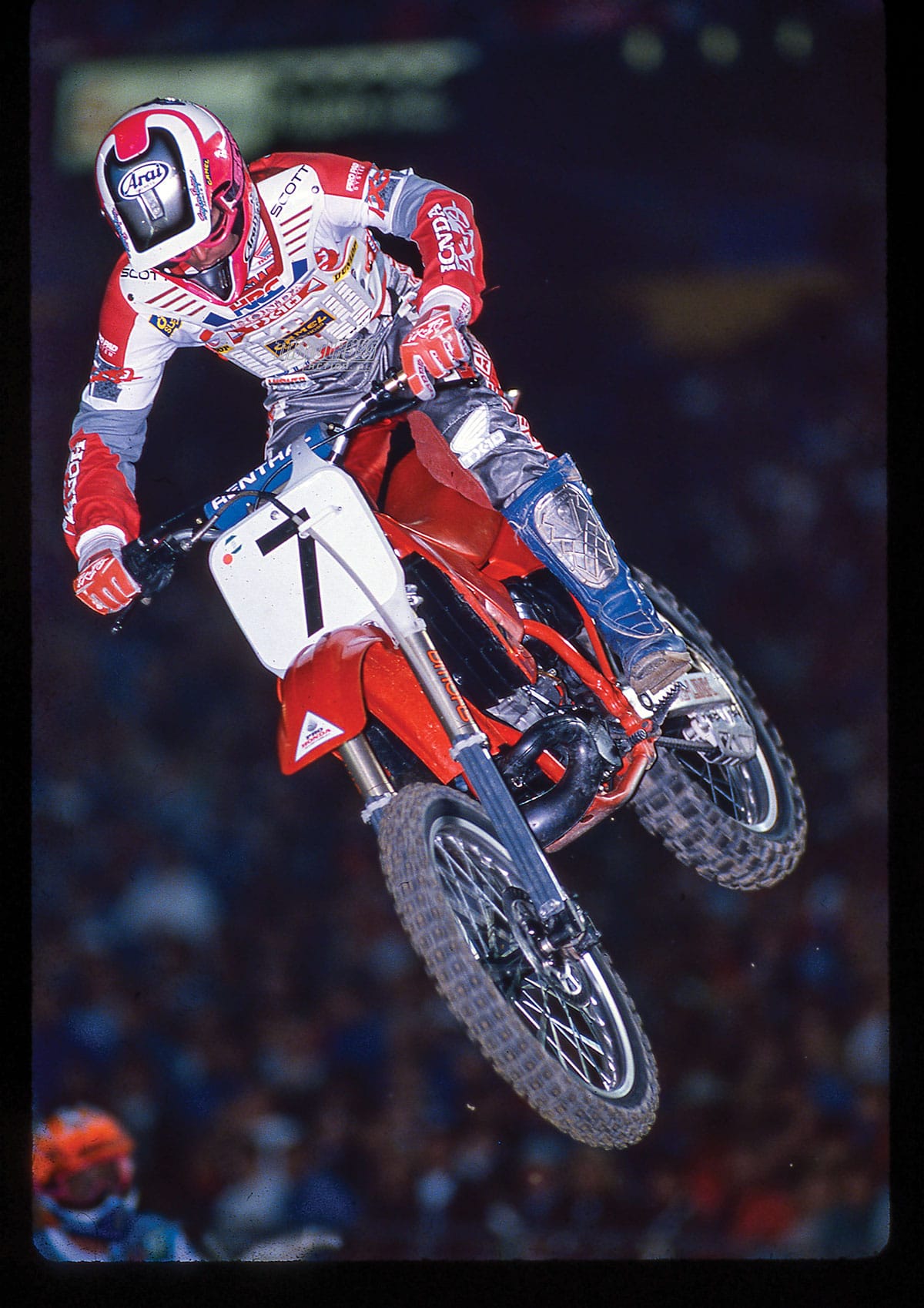
YOU WERE STILL YOUNG AND SUCCESSFUL WHEN YOU RETIRED. WHY WAS THAT? I did over 50 races a year for four or five years. In the early 1990s, the European racing was unbelievable. The show-up money to go race Bercy and off-season races was through the roof, so I was not going to turn that money down. So, I would do all the AMA Supercross races, AMA Nationals and the two GPs with American Honda (the USGP and the one in Japan), then I would do as many invitational races as I could. I would go to Europe and race three to four nights a week at $30,000 to $50,000 a night. Modern riders now complain if they have to race 29 times a year. There were four years where I basically raced two years’ worth in each year, but I made more money over there than I did over here by winning championships. Ultimately, my career was shortened three to four years because of training, traveling, staying focused, and doing that many races a year for years.
DO YOU REGRET RETIRING SO EARLY? No, not at all. It is no fun in fifth or sixth place and struggling, so I was fortunate to have a great year. I had some injuries, and it is common knowledge that in the later part of my career, I trained too much and wore my body down. You may think it is the right way to go because you are winning and doing what you are doing while everybody around you says, “You need to eat more. You need to do this, and you need to do that.” But, when you are winning, you do not change things; you are stuck in your groove. So, I hurt myself by not focusing on the right things late in my career. I was burned out. I had enough. There was no reason to leave hurt or struggling with poor finishes.
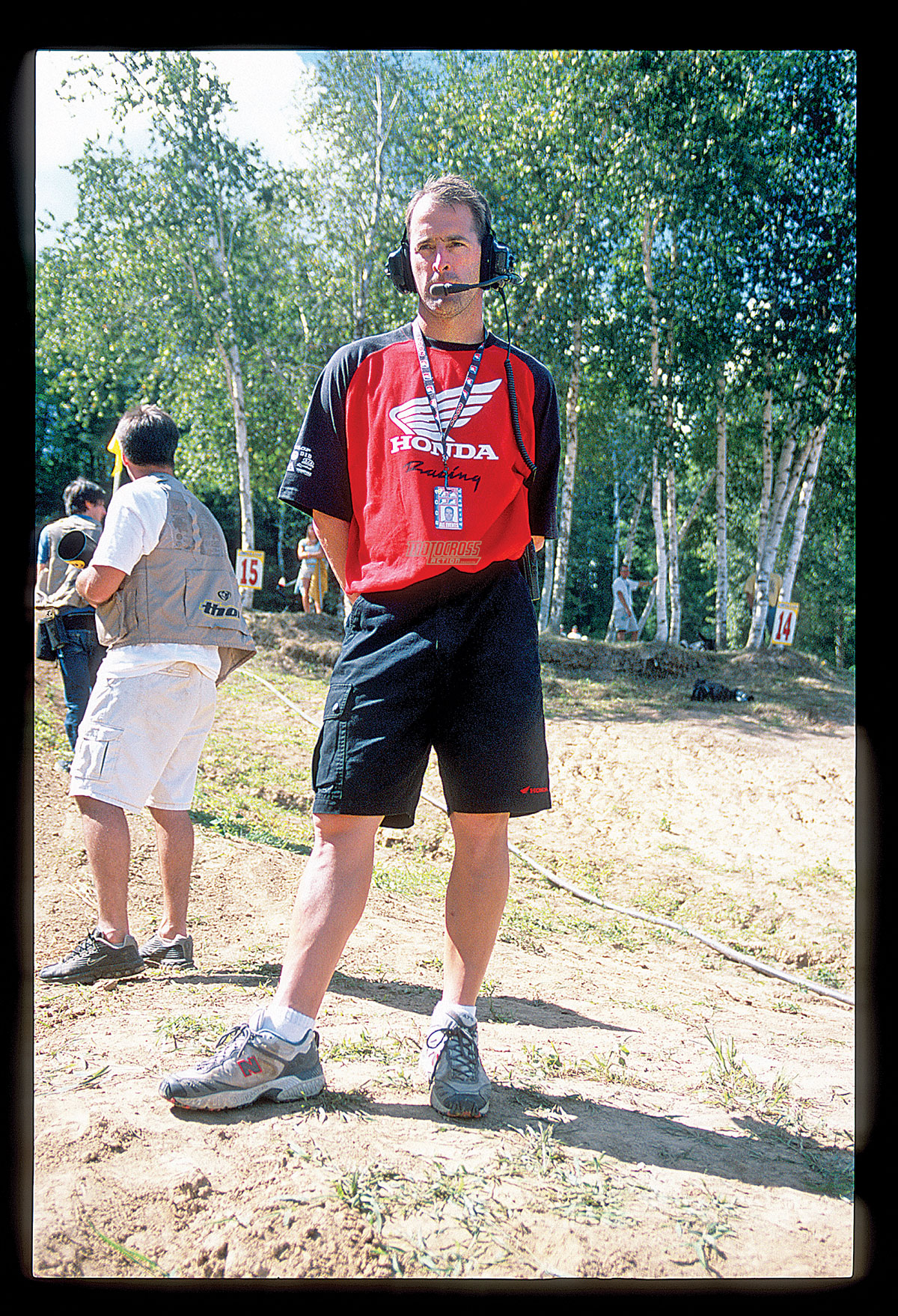
AFTER RETIRING, YOU REMAINED WITH TEAM HONDA AS A CONSULTANT. WAS THAT A GOOD TRANSITION? I did that for almost 10 years. For the first four to five years, I went to every race. My job was to help the riders. I had been there, done it, seen it and been through it, so it was a great transition actually. I was still able to be involved in the sport, help a bunch of great riders and work with up-and-coming riders to help them succeed. I was there when Ricky Carmichael was on Honda and became great friends with him. Ricky and I have a great relationship to this day, and I help him with a bunch of events. I was still able to be on the payroll for 10 years after my racing days ended. Then, my kids got older, and the last thing I wanted to do was be on the road 30 weekends a year. So, I came back to Michigan and life goes on.
“MY LAST TWO MOTOCROSS DES NATIONS VICTORIES WERE SUPER EMOTIONAL. IT WAS JUST THE WAY THEY PLAYED OUT AND
TURNED OUT WITH THE PEOPLE WHO WERE THERE.”
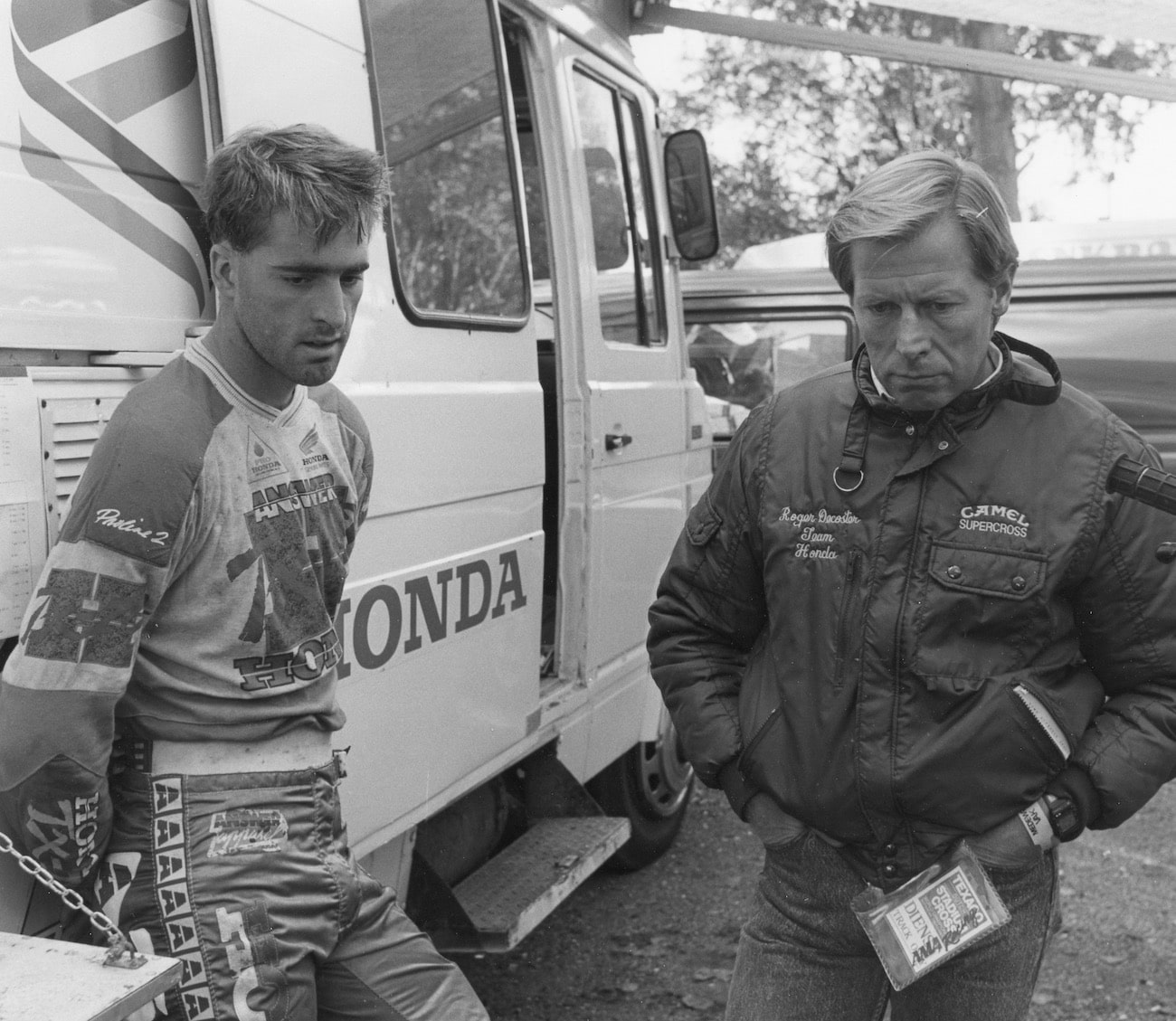
DO YOU HAVE A MEMORY OF YOUR GREATEST RACE? I have a bunch of good ones. All of my Daytona races were tough and memorable, with either Bayle or Bradshaw battling me. So, the Daytona trophies that I have in my trophy room meant a lot to me, because back then it was a whole week of racing. It was not only all the Supercross people watching you; all the road racers were watching you, and all the dirt trackers were watching you. There are so many different venues of racing there that I put Daytona at the top of my list of ones that I wanted to win. After I won the Daytona Supercross, I would stay on Sunday and watch the Daytona 200. Any of the six AMA Championships are important, but I had three super great Motocross des Nations wins that certainly were very memorable. My last two Motocross des Nations victories were super emotional. It was just the way they played out and turned out with the people who were there.

WHY IS THE MOTOCROSS DES NATIONS SO IMPORTANT TO YOU? Because I followed behind Bailey and Johnson. Go back and watch Maggiora with O’Mara, Bailey and Johnson when they won the Motocross of Nations—that is the race where Johnny O’Mara is beating everybody on the 125. They went on a winning streak that was like no other. They were at the top, so when you come up behind those guys, you want to keep it at the same level. They had dominated the MXDN for so many years that you don’t want to be the new guys who lose that streak. You take it seriously. At my first MXDN in 1989 with Mike Kiedrowski and Jeff Ward in Germany, I was scared to death. That was when they lined up 80 guys on the starting line. Two rows of 40, so you had 80 guys on the line. The first moto is 125s and 250s. The second moto is 250s and 125s, and the third moto is 250s and 500s. It was awesome. The riders took a lot of pride in how well we did. We wanted to win badly. It is like the Olympics of Motocross. You wanted to be the best at it. I loved every one of them. Motocross des Nations is right up there in the top three of all the wins that I have.
DO YOU THINK THE MXDN HAS LOST THE SUPPORT OF AMERICAN RIDERS? One hundred percent it has. There is absolutely no moral value left in it at all. All the riders are worried about winning a million dollars the next week at the Monster Cup. I get it, but it makes me angry. I am not afraid to say it, and I have said it more than once: Team USA has lost the MXDN for so many years that they don’t care about it now—and that’s the truth. I came from that era when Americans dominated, and I did not want to be the one to lose that domination. Now the fire has gone out. It would not surprise me if there were no Team USA at the Motocross des Nations in the future. Hopefully, it won’t come to that, but they need a whole new bloodline to change everything that is going on.
“I THINK THAT FOUR-STROKES ARE GOING TO END UP BEING THE DEATH
OF THE MANUFACTURERS. HOW MANY FRIENDS DO YOU HAVE WHO
CAN GO OUT AND BUY A $9000 BIKE EVERY YEAR. FOUR-STROKES
HAVE PRICED EVERYONE OUT OF THE MARKET.”
WHAT ARE THE BIGGEST CHANGES TO THE SPORT FROM YOUR DAYS ON TOP? The biggest change is four-strokes. We all had to have a new four-stroke, but now I think that four-strokes are going to end up being the death of the manufacturers. How many friends do you have who can go out and buy a $9000 bike every year. Four-strokes have priced everyone out of the market. And if the manufacturers don’t sell a lot of the bikes, they are not going to be able to afford to go racing. There is no other way to put it. If it weren’t for energy drinks supporting the manufacturers and the Monster Energy Supercross series, we would be in a world of trouble; we really would. The days of selling 200,000 dirt bikes, 200,000 helmets and 200,000 accessories are long gone. The average Joe wants to ride his motocross bike, but the racing end has been sucked dry.
IS THERE A RIDER WHO STANDS OUT TO YOU RIGHT NOW? Nobody really stands out. I would say Eli Tomac. He should have won three Supercross Championships by now, but he will haul butt one weekend and then get sixth the next week, which leaves you wondering what happened in the six days between those two races. Ken Roczen is Ken Roczen, and it is what it is. I am over his whole situation. He is all secretive. And all of this “I am sick, I am sick, I am sick….” If I were Honda, I would want to know what is really the matter with him. It is his own problem and his own world. Will he ever make it? I hope for Honda’s sake that he does win a title for them, but I don’t see it happening.
ANY LONG SHOTS YOU WOULD HAVE BET ON BEFORE THE SEASON STARTED? Justin Barcia had the opportunities in the past and did not make it happen. But this year he is happily married, his training is good, and his health is fine. He is in tight with Yamaha, and his bikes are improved. I would have loved to see all the pieces of the puzzle fit this year. He needs a little good luck. I had luck when RJ got hurt. But you create your own luck by working hard, keeping your nose clean, busting your butt and making it happen. Justin is like a son to me. I worked with him for four years. My heart is with Justin, always has been.
WHAT ARE YOUR THOUGHTS ABOUT THE FUTURE OF PRO RACING? The sport is never going to dry up, but it could develop into having only one or two fast kids a year versus the 10 fast kids a year that came into the ranks 15 years ago. There are fast kids coming up, but those fast kids obviously have some wealth behind them. Will the sport continue? Yes, the manufacturers are going from three to four riders to one to two riders. I appreciate that there are privateer teams coming in to help guys get to events, but the wealth of the sport is disproportionate. You have Tomac and Roczen making multi-million-dollar figures and the 20th-place rider on the start line driving himself there in a van. It has always been that way. That will never change. Even if the manufacturers gave every rider on the line the same bonuses as they pay their stars, they most likely would never see any of that money.
CRITICS SAY THAT YOU DIDN’T HAVE THE MOST NATURAL TALENT BUT WORKED HARDER THAN EVERYBODY ELSE. TRUE? That’s true. I try to instill that even in the 8th-grade basketball kids that I work with. I tell them that with determination and hard work they can accomplish anything they set their minds to. It is hard for kids to get it now with social media and phones dominating their lives. I think that Ricky Carmichael was somewhat in the same boat as me. Ricky was not the most naturally talented rider. He did not have the body for it. He was short and squatty, but he made up for it with hard work and determination.
WORDS OF WISDOM? With motocross, you have to have a passion for it above all else. You have to believe that it is going to happen, and you have to have a little luck.


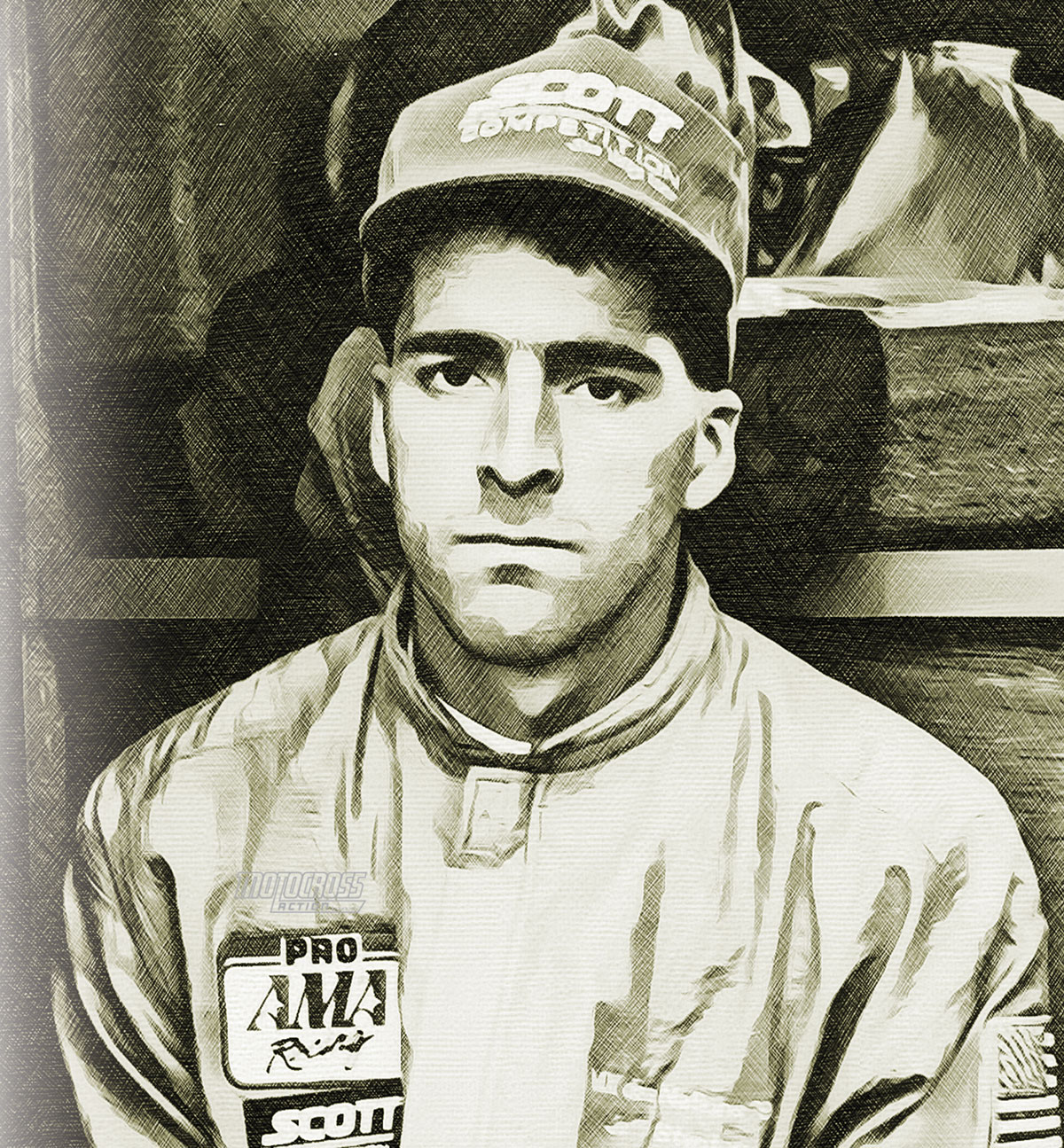






Comments are closed.